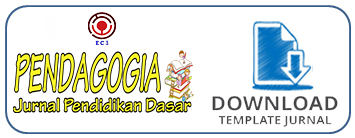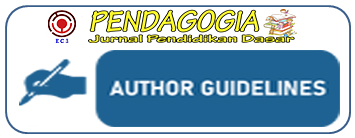Hubungan Kecerdasan Emosional dengan Hasil Belajar PPKnSiswa Kelas IV Madrasah Ibtidaiyah
Keywords:
Emotional Intelligence, Learning Outcomes, PPKn, Madrasah Ibtidaiyah, CorrelationAbstract
Emotional intelligence plays an important role in improving student learning outcomes, especially in the context of Pancasila and Citizenship Education (PPKn), which places an emphasis on values, attitudes, and responsibilities. The purpose of this study was to determine whether emotional intelligence and PPKn learning outcomes were in class IV students of MI An-Noor Karangasri, Ngawi are in fact substantially correlated. To address this objective, the study employs a quantitative approach using a correlation method. A total of 20 fourth-grade students were involved as respondents, selected through total sampling. Data was collected through a questionnaire to determine students' emotional intelligence levels and their PPKn subject grades as indicators of learning outcomes. With a correlation value of 0.702 and a significance of 0.000 (p < 0.05), the results of the study indicate a fairly large positive relationship between emotional intelligence and learning outcomes, with emotional intelligence contributing 49.28% of student learning outcomes. Other factors not covered in this study impact the remaining 50.72%. The importance of the affective component, especially emotional intelligence, in the PPKn learning process in elementary schools is emphasized in this study.
Downloads
References
Aswat, H., Sari, E. R., Aprilia, R., Fadli, A., & Milda, M. (2021). Implikasi distance learning di masa pandemi COVID 19 terhadap kecerdasan emosional anak di sekolah dasar. Jurnal Basicedu, 5(2), 761–771.
Aththibby, A. R. (2015). Pengembangan media pembelajaran fisika berbasis animasi flash topik bahasan usaha dan energi. JPF (Jurnal Pendidikan Fisika) FKIP UM Metro, 3(2).
Chintya, R., & Sit, M. (2024). Analisis teori Daniel Goleman dalam perkembangan kecerdasan emosi anak usia dini. Absorbent Mind, 4(1), 159–168.
Galuh, A. D., Maharani, D., Meynawati, L., Anggraeni, D., & Furnamasari, Y. F. (2021). Urgensi nilai dan moral dalam upaya meningkatkan pendidikan karakter melalui pembelajaran pkn di sekolah dasar. Jurnal Basicedu, 5(6), 5169–5178.
Hidayati, F. N. (2019). Hubungan Kemampuan Kecerdasan Emosional Dengan Hasil Belajar Pkn Kelas Iv Di Sd Negeri 2 Kemiling Permai Bandar Lampung. UIN Raden Intan Lampung.
Kamaruddin, I., Leuwol, F. S., Putra, R. P., Aina, M., Suwarma, D. M., & Zulfikhar, R. (2023). Dampak Penggunaan Gadget pada Kesehatan Mental dan Motivasi Belajar Siswa di Sekolah. Journal on Education, 6(1), 307–316.
Kurniadi, O. (2021). Hubungan antara Kecerdasan Emosional dengan Hasil Belajar PPKn Siswa Kelas IV MIS Sukarami, Kecamatan Air Nipis, Kabupaten Bengkulu Selatan. UIN Fatmawati Sukarno Bengkulu.
Oktaviani, A. M., Iskandar, A. M., & Nurlina, S. (2022). Implementasi Model Pembelajaran Debate dalam Meningkatkan Kecerdasan Emosional Siswa. PEGAS (Jurnal Pendidikan Guru Sekolah Dasar), 1(1), 17–24.
Pristiani, D. (2019). Hubungan Kecerdasan Emosional dan Perilaku Disiplin Terhadap Hasil Belajar Pkn Siswa Kelas V MIN 9 Bandar Lampung. UIN Raden Intan Lampung.
Sofyani, N., & Susanto, R. (2019). Analisis Keterkaitan Kecerdasan Emosional (Emotional Quotient) Dan Ketahanmalangan (Adversity Quotient) Dalam Pembentukan Motivasi Belajar Siswa Kelas VA Di Sekolah Dasar Negeri Jelambar Baru 01. Dinamika Sekolah Dasar, 1(1), 1–13.
Sugiyono. (2015). Statistik untuk Penelitian. Bandung: Alfabeta.
Trilling, B., & Fadel, C. (2009). 21st century skills: Learning for life in our times. John Wiley & Sons.
Ulum, I. R. (2017). Hubungan kecerdasan emosional dan motivasi belajar terhadap hasil belajar PPKn kelas II. Joyful Learning Journal. Retrieved from Link PDF
Waruwu, M., Puat, S. N., Utami, P. R., Yanti, E., & Rusydiana, M. (2025). Metode penelitian kuantitatif: Konsep, jenis, tahapan dan kelebihan. Jurnal Ilmiah Profesi Pendidikan, 10(1), 917–932.
Downloads
Published
Issue
Section
License
Copyright (c) 2025 Anjarwati, Nur Hikmah, Siti Qori’ah

This work is licensed under a Creative Commons Attribution-NonCommercial-ShareAlike 4.0 International License.








